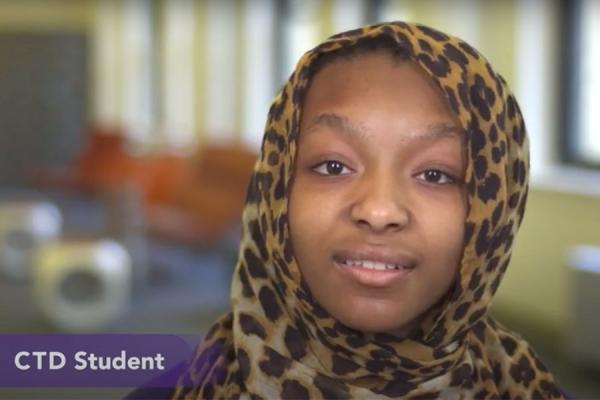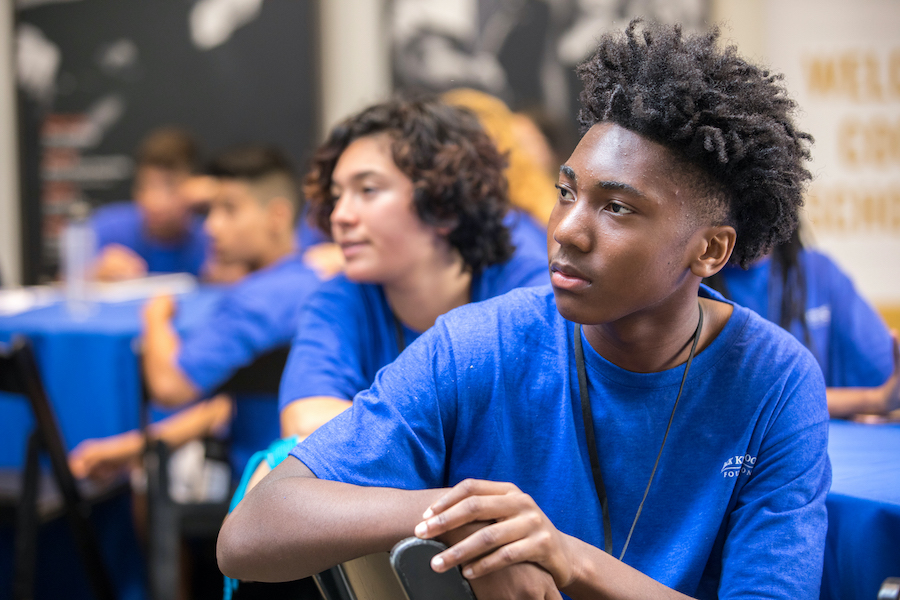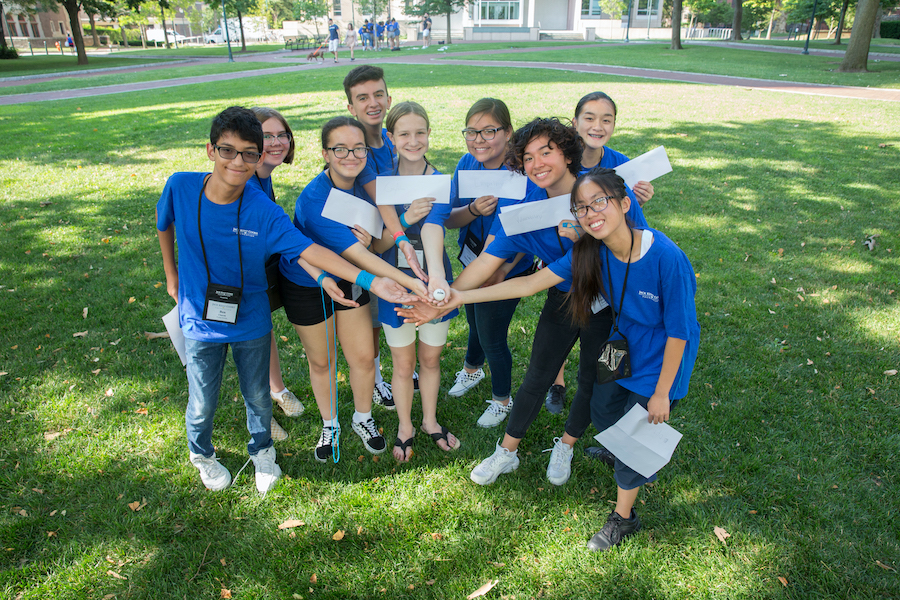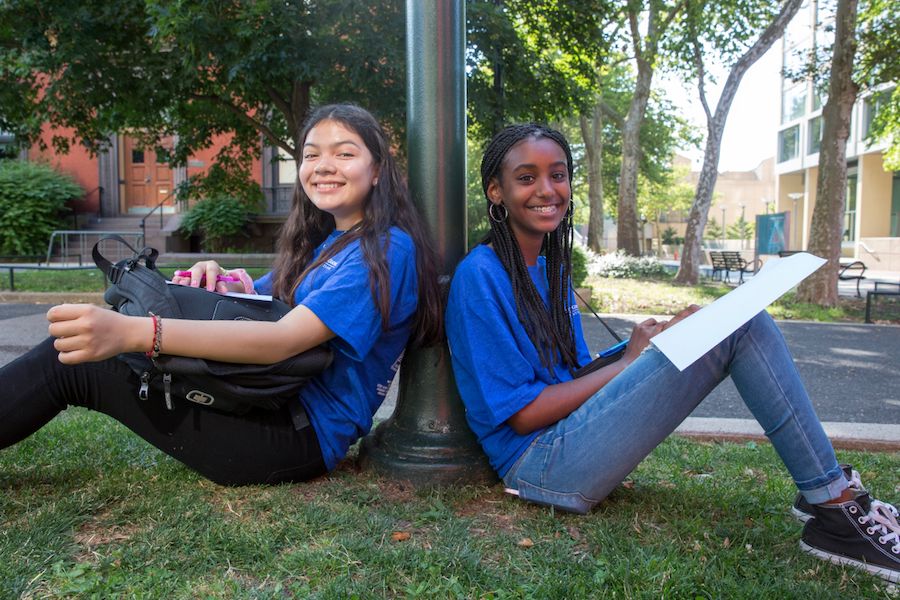The JKCF First Summer Experience
First Summer is the place where Scholars from around the country join to form a vibrant community, one comprised of different voices, perspectives, and talents. At the close of this immersive three-week experience, Scholars will return home as one unified cohort, inspired to dream of the future and emboldened to make those dreams come true.
This summer, the Jack Kent Cooke Foundation will partner with CTD's Civic Education Project (CEP) to present First Summer at the Civic Leadership Institute (CLI). CLI will provide Scholars a unique opportunity to explore current social and political issues through service-learning, exchanges with community leaders, and academic study. Set within an interactive curriculum taught by CTD instructional staff, Scholars will examine and problem-solve some of today’s most pressing social issues and explore ways they are inspired to make change.
Scholars will register for First Summer at the Civic Leadership Institute via MyCTD.
Registration Details
- Within MyCTD, Scholars should select "First Summer: Civic Leadership Institute" as their course selection.
- Scholars should select "pre-qualified review applicant" as their registration method. Scholars do not need to supply any additional information (grade reports, test scores, etc.) with their application.
- No payment is required at the time of registration. Program fees (including organized JKCF residential activities and transportation to/from the airport) are paid by JKCF. Scholars should select "No" to the question "Are you applying for financial aid?" and include the waiver code (issued by JKCF Educational Advisers) beneath the financial aid question to note their JKCF Young Scholar Status.
- Scholars will receive enrollment information for the program the week of May 1 after all registrations are received.
Scholars will challenge themselves to learn in new ways and apply their skills in real-world settings at CLI through a 3-week service-learning course. View a sample syllabus.
CLI Experience
Service-Learning
Scholars will participate in hands-on, immersive learning experiences as active and engaged citizens to build their intellectual capacity, leadership skills, and potential to make change. All in-person service-learning projects will adhere to CTD and Northwestern University COVID-19 safety protocols, in support of CDC guidelines; see details here.
Seminars
Scholars will examine pressing social issues through a critical lens, absorb and engage in academic research, and dialogue with peers to identify diverse viewpoints and consider new ideas.
Speakers
Scholars will meet with government, business, and nonprofit leaders to hear their experiences about how to make real change in communities.
Action Plan
Scholars will work in groups to select an area of interest and synthesize the learning experience to develop a plan for change under the mentorship of instructional staff.
Community-Building
Scholars will engage in various activities, including residential life, to strengthen communication and understanding among the cohort.
Northwestern University
Set in the charming city of Evanston, IL, north of Chicago and on the coast of Lake Michigan, Northwestern University is a leading research and teaching university.
Inclusive Community
CLI offers an opportunity for Scholars to experience a true living-learning community. All Scholars will live as a cohort in one residence hall on campus, under the supervision of trained residential staff. Each residential teaching assistant (RTA) is responsible for a group of approximately 10 Scholars.
Scholars will be assigned to double or single occupancy rooms and live on all-gender floors, and are roomed by gender identity. Scholars eat with residential and teaching staff and other members of the university community in a dining hall on campus. Scholars also have limited access to other campus facilities, including libraries, computer labs, and athletic fields. Additional details about the residence hall will be shared in student enrollment information.
CTD addresses the needs and concerns of all students, including trans and non-binary students, to ensure a safe, affirming, and healthy environment. Parents or students may coordinate support for trans and non-binary students by contacting the program office at cep@northwestern.edu.
Sample Daily Schedule
7:00 - 9:00: Students get ready for the day, eat breakfast, and transition to class
9:00 - 12:00: Morning class session
12:00 - 1:00: Lunch
1:00 – 3:00: Afternoon class session
3:00 - 3:15: Students transition to residence halls
3:30 - 5:30: Afternoon activities and sign-out
5:30 - 7:00: Sign in, dinner, and downtime
7:00 - 9:00: Evening RTA office hours, study sessions, and sign-out
9:00: Residential curfew
Campus Boundaries and Sign Out
Students are expected to be within clearly defined campus or community boundaries at all times. Students may not be outside these boundaries at any time without a staff member. During designated activity times, students may sign out with a buddy to take short walking trips to recreational sites close to campus. Students must remain with their buddy and stay within designated walking boundaries during the entire sign out period. Students must sign back in upon returning. Students must always be with a buddy when outside the residence hall.
Meals
Lunch on Opening Day is the first meal provided for students; the final meal is lunch on Closing Day. Students and staff members eat most meals in a Northwestern University dining hall. Breakfast, lunch, and dinner are served each weekday. On weekends, the dining service provides a longer brunch period and dinner, and a continental breakfast will be available at the residence hall. For service-learning experiences, bag lunches are provided. Ample food choices, including vegetarian options, are available at each meal, and student enrollment information will have additional details about planning for student dietary restrictions and food allergies. Students can store packaged snacks in their residence hall rooms, and communal fridges in the residence hall are available for food storage.
Laundry
The laundry room in the residence hall is available to students during designated hours; laundry machines are free of charge. Students must supply their own laundry supplies, and are responsible for washing their own clothes. Families should provide their students with a laundry tutorial before arriving on campus. Residential staff will also be available to provide laundry tips.
Spending Money and Packing List
In general, we recommend that students bring approximately $50 – $100 in spending money for the three-week session for snacks, souvenirs, and personal items. Program tuition covers all meals and admission fees for organized residential outings. However, tastes and budgets differ greatly, so families should budget spending money however makes the most sense for them. Students are responsible for whatever spending money they bring and should budget their money carefully.
A packing list will be provided with student enrollment information.
Opening & Closing Days
| Opening Day | Sunday, June 25 |
| Closing Day | Friday, July 14 |
On Opening and Closing Days, program staff will provide transportation to/from the airport, which will be included in program fees. CTD cannot provide housing and supervision for residential students beyond the published dates of the program session in which they are enrolled.
Scholar safety is paramount at all times during CLI. We take careful steps to ensure the well-being of our Scholars on and off campus, including:
Hiring Experienced Staff Members
Our staff is a talented group of educators brought together by their commitment to teaching highly able young people about civic engagement and social responsibility. Our instructional staff are typically outstanding teachers from secondary schools or universities, graduate students, or youth development professionals with expertise in service-learning. Our residential teaching staff are typically college graduates working in the education or nonprofit fields or junior- or senior-level undergraduates with a background in residential life. All staff are selected through a highly competitive process that weighs such factors as academic background, service-learning experience, and experience working with youth in a residential setting. The process also includes a criminal background check.
Working with Established & Well-Respected Host Agencies
We work closely with host organizations to provide safe volunteer and learning environments. Host agencies orient Scholars to the communities and activities they will be engaged in and outline precautions Scholars can take to minimize risk and help ensure the safety and well-being of all group members.
Providing Careful Supervision
While Scholars are ultimately responsible for their own conduct, our trained staff teams work together to provide clear guidelines and careful supervision. Each group of approximately 10 Scholars is supervised by an instructor and teaching assistant during class time and field experiences, and by the residential teaching assistant staff during evening and weekend hours. Administrative staff are also on site at all times to provide support and supervision.
Requiring a High Standard of Scholar Conduct
Our programs are highly structured and operate with a strict set of rules regarding campus and community boundaries and appropriate staff supervision. These rules help to ensure the well-being of our Scholars and staff, and all Scholars who attend must be committed to respecting them. Scholars and families are asked to review the CTD Honor Code so that all participants are aware of the program's expectations and their personal responsibility to contribute to a positive living and learning environment.
COVID-19 Health & Safety
In response to the COVID-19 pandemic, CTD will implement health and safety policies and procedures based on Northwestern University and CDC policies in effect at the time of each program. Following guidance from Northwestern University:
- CTD strongly recommends that scholars are vaccinated and boosted with an updated bivalent vaccine against COVID-19.
- Regardless of vaccination status, scholars are subject to testing for COVID-19 during the program if they exhibit one or more common symptoms of COVID-19.
- Scholars must be tested for COVID-19 prior to arrival at Welcome Weekend. All families will upload documentation provided by a third-party clinician or at home test of their student’s negative COVID-19 test taken within 72 hours prior to their arrival. Scholars will not be allowed to move into residence halls until a negative test is received.
- Scholars who test positive for COVID-19 during the program must be picked up within 24hrs of notification by a parent/guardian or other adult designee. Care will be provided on-site until the family member or designee arrives. Please be aware that a positive test result would likely make a child ineligible to travel by air, train, or bus, making it essential that all scholars have a parent or designated adult who will be in the United States and able to retrieve them from campus.
- CTD cannot provide housing and supervision for scholars beyond the published dates of the program session in which they are enrolled for any reason.
Northwestern University COVID-19 Health and Safety policies are reviewed regularly and periodically updated in response to ongoing data monitoring and guidance from public health officials and are therefore subject to change. During the program, program administrators will take a conditions-based approach to managing program activities based on risk levels as reported by the CDC and Illinois Department of Public Health. COVID-19 health and safety protocols may include measures such as masks, distancing, additional cleaning protocols, changes to scheduled program activities, and Northwestern University policies as warranted by current public health conditions.
Student Health & Medications
Families will complete and submit an online health form via CampDoc prior to the program. This form will contain information about scholars' emergency contacts, pertinent health and medical history, medications, and grants permission for program staff to administer non-prescription medications and seek medical care for scholars when necessary. Information about CampDoc, including instructions on completing the health form, will be sent to families via e-mail in mid-May.
During the program, scholar medications (over-the-counter as well as prescription) will be kept in the residence hall site office in a secure location. As an exception, scholars are encouraged to keep a single dose of emergency use medications with them at all times during the program. Scholars will be able to access medications when necessary, and must be able to self-administer medications. All medications scholars bring to campus must be in original containers, with contents and dosage instructions clearly labeled and written in English.
Additional information about scholar health and medication policies will be included in student enrollment information.
- For general questions about First Summer with JKCF, please contact your JKCF Educational Adviser.
- For questions regarding First Summer at CLI program registration, please contact:
ctd-admissions@northwestern.edu






